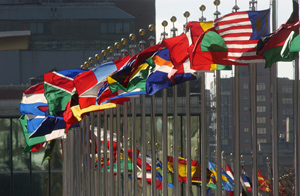September 24, 2018
Mercy Day
During the past several months, Mercy at the UN has been advocating intensely to influence the UN Post-2015 Development Agenda and the formulation of the Sustainable Development Goals (SDGs). Because these goals will direct UN global development efforts for the next several years, our advocacy efforts will increase in order to ensure an agenda that is truly just, sustainable and people-centered, grounded in an understanding of the rights of people and the environment.
 The international framework of human rights treaties and accountability mechanisms are increasingly important to our members at the grassroots. Thus, this framework must be the foundation of the SDGs and the broader post-2015 agenda.
The international framework of human rights treaties and accountability mechanisms are increasingly important to our members at the grassroots. Thus, this framework must be the foundation of the SDGs and the broader post-2015 agenda.
Mercy sees the post-2015 process as an opportunity to challenge the predominant paradigm of development that privileges market-led economic growth at any and all costs, a system most obviously visible in extractive industries operating at transnational and national levels. Mercy understands firsthand that the post-2015 agenda must transform both resource extraction and the development model that promotes it. With our UN Mining Working Group (MWG) colleagues, we recognize that it is an indispensable requirement of sustainable development to guarantee the necessary resources, capabilities, choices, security, and power for individuals and groups to fully enjoy their human rights. We will continue to act with our colleagues in the MWG to ensure this outcome. Our approach includes:
If the SDGs are to be truly transformative, the people should set the course. The people know who and what have created an unsustainable, unequal world and they know how a vision of sustainability can be realized. Far beyond focusing on lifestyle changes in how we live, work and use our natural resources, the most urgent political and public need of our time is to change the corporate power structure that has had free reign over the economy, the ecology, and the lives and livelihoods of the people.
Most troubling in today’s global and political analysis is the absence of addressing the need for structural, systemic, and root-cause analysis to bring about change in the systems that have robbed peoples, future generations and the planet of opportunity and even life. To be truly radical and transformative, we must address the root causes of poverty and the economic, financial, political, cultural and social systems that render persons poor and that destroy vital ecosystems.
The predominant emphasis on a technological fix—without assessing and addressing the systemic and root causes of unsustainable development, poverty and human rights and ecological violations—limits our vision and possibility. Moreover, it scandalizes those who have been rendered poor as result of this focus.
The Universal Declaration on Human Rights is founded upon such principles; a Universal Declaration on Sustainable Development must proclaim these as well. In fact, we ultimately seek the adoption of the Universal Declaration of the Rights of Mother Earth.
Linda Sheehan of the Earth Law Center has proposed in her blog posting “There is no planet B” a most visionary question on sustainable development: Is sustainable development our end goal? Or should we be aiming for sustainable—or better yet, “thriving”—communities of humans and ecosystems flourishing together?
This is the real question of our time and one that must drive the deliberations of the United Nations. The UN has a critical role to play in seizing and implementing a vision for our world that is not only for the peoples and our Planet, but is by the peoples and our Planet as well.
In addition to the SDGs, the Mercy focus going forward will:
• address the gendered impact of extractvism and mining;
• investigate the link between mining and human trafficking and the exploitation and violence caused by the current unsustainable development model;
• explore with membership alternatives to the current model of development and to the extractive model of development;
• expose what is happening globally when the right to water and sanitation fails to be recognized, and offer possibilities for full realization of the right;
• build capacity of members to use human rights mechanisms to address concerns related to fracking;
• address commodification of nature and the privatization of the global development agenda that favors corporate rights over peoples’ rights and concerns of Earth;
• call upon the UN and Member States to address root causes of human trafficking, applying strategic approaches to the question of global inequalities.
Overall, we will continue to address our Mercy Global Concerns at the UN through:
• working as a Mercy Global Action team to share the grassroots perspective and act on our concerns;
• using the human rights mechanism as it applies to the various issues;
• collaborating with NGOs at the UN and with global alliances, as we have been doing with water and extractives issues;
• challenging the root causes and proposing alternatives;
• bringing grassroots perspectives to the United Nations and to global policy-making.
Messages to: Aine O’Connor rsm - MGA Co-ordinator at the UN
Image: Flags of member nations flying at United Nations Headquarters. UN Photo/Joao Araujo Pinto. Used with permission